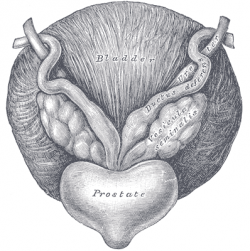Are You Looking for the Best Prostate Supplements?
Our Top Prostate Supplements for 2014
Then you came to the right place! As the #1 source for information on prostate issues, we take pride in helping you discover treatments and remedies. To help us select the Best Prostate Pills and Supplements, we researched hundreds of treatments and came up with the following results, based on what we have determined to be the 9 most important factors:
- 1. Effectiveness
- 2. Speed of Results
- 3. Quality of Ingredients
- 4. Product Safety
- 5. Customer Service
- 6. Customer Feedback
- 7. Reorder Rate
- 8. Return Policy
- 9. Success Rate
Click Here to Compare the Ingredients in Our Top 5 Products
Enlarged Prostate: The Basics
 Many men do not even realize they have a prostate, at least until they get into their 30s and 40s.
Many men do not even realize they have a prostate, at least until they get into their 30s and 40s.
At this point this gland, which is just a little larger than a walnut, begins to grow. Shaped like a donut and encircling the urethra right below the bladder, it can start causing frequent urination for many men, especially at night. Its primary function is to add seminal fluid to semen as it passes through the body.
According to James Smolev, M.D. who is an assistant professor of urology at Johns Hopkins, the enlargement of the prostate is related to the development of prostate cancer. For this reason, it is recommended that all men aged 45 and older get a prostate exam once a year. In most case, cancer does not develop and a condition called benign prostatic hypertrophy (BPH) occurs instead. This is the medical term for an enlarged prostate.
Symptoms
The more the prostate grows, the more it causes pressure on the urethra. The muscles around the urethra tighten up, which results in even more pressure. While this does not hurt, it can often lead to problems with urination. Men might have to urinate with extreme urgency, have trouble starting the flow of urine, have trouble maintaining a strong flow, have trouble ending the flow, and have to get up repeatedly throughout the night (a condition called nocturia).
Causes
The reason why the prostate grows in men is directly related to certain hormones that change when they get older. Once males turn 40, their testosterone levels drop and other hormones, like prolactin, increase their presence. According to Joseph Pizzorno, N.D., president of Bastyr University, states, “The ultimate effect of these changes is an increase in the male sex hormone, dihydrotestosterone, in the prostate. Dihydrotestosterone is responsible for the overgrowth of prostate tissue that produces BPH.”
Essentially, the enzyme known as 5-alpha-reductase causes testosterone to change into dihydrotestosterone. Many BPH remedies work by inhibiting this enzyme’s ability to cause this change.
Treatment
More than 50% of all men over the age of 50 will get some of the signs of BPH. This percentage goes up with age. Typically, the symptoms of BPH worsen if not treated, but this varies from case to case; there is no way to tell who will experience the symptoms and who won’t. Based on information from Richard Macchia, M.D., who is a professor of urology at the State University of New York Health Science Center, certain men experience a significant worsening of symptoms over about six years. Other men might not notice a change for 15 years or more. There are some men whose symptoms never get worse at all. An even smaller number of men even see a decrease in their symptoms without treating them at all. However, the majority of men start by waking up once or twice a night, and end up waking up many more times as they get older. Family history of BPH is the only indicator known for the development of severe BPH.
Whether or not a man should seek treatment for BPH is up to each man. Dr. Smolev states, “It’s an individual decision. When he feels persistently uncomfortable with his urination during the day, or when he gets fed up with getting up at night.”
The majority of doctors will probably prescribe prescription medications or surgery, but BPH can often be treated successfully with natural remedies as well.
